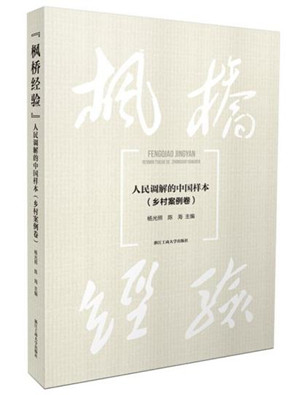


A Chinese paradigm of people's mediation

Fengqiao Experience: A Chinese Sample of People’s Mediation
Fengqiao Experience: A Chinese Sample of People’s Mediation offers a unique perspective by delving into the intrinsic connection between “primary-level governance” and “national governance” through the lens of peoples’ mediation cases. The book distills the typical experiences of people’s mediation practices under the guidance of the “Fengqiao experience,” showcasing the foundational and dominant position of people’s mediation in modernizing primary-level governance.
The Fengqiao experience, which has successfully served as a paradigm for innovating primary-level governance and promoting peace and harmony, originated over six decades ago in a small town located south of the Yangtze River. Relying on primary-level organizations, it gives priority to mediation and prevention, striving to provide simple, efficient, and economical ways to resolve disputes.
As an integral part of the Fengqiao experience, people’s mediation has deep roots in Chinese society and is deeply intertwined with Chinese culture. Whether it is the traditional emphasis on harmony or the new judicial system represented by the mediation system established in the border areas of Shaanxi, Gansu, and Ningxia, mediation has always been at the forefront of resolving conflicts and disputes. Even today, people’s mediation remains an effective means for primary-level communities to achieve self-management, self-education, self-supervision, and self-improvement.
Under the chief editorship of Yang Guangzhao, Shen Yindi, and Wang Shirong, experts on national people’s mediation, the book delves into the realms of rural areas, urban settings, and enterprises, respectively. It encompasses a wide array of aspects of people’s lives, including marriage and family, labor disputes, negotiations regarding migrant workers’ salaries, private lending, compensation for damages, land expropriation and demolition, real estate management, and elevator installation.
These cases not only exhibit a certain degree of universality, but also feature novelty and exemplification. Specifically, they encompass a clear record of disputes, accurate descriptions of conflicting focal points, detailed explanations of resolution strategies, in-depth explorations of underlying philosophies, and an objective presentation of mediation outcomes.
At present, China is facing regular and long-term governance challenges in the realm of urban-rural integration, an aging society, and the internet. In this context, a firm first-line defense that enables the local settlement of disputes represents a priority for consolidating social stability and improving the comprehensive management mechanism for social conflicts. By encompassing rich legal principles and the specific methodologies of people’s mediation, these cases serve to enhance readers’ recognition of people’s mediation as the preferred approach to conflict resolution, thereby fostering a conducive legal environment and social atmosphere for upholding social harmony and stability.
Yan Cunsheng is a professor from the Northwest University of Political Science and Law.
Editor:Yang Lanlan
Copyright©2023 CSSN All Rights Reserved